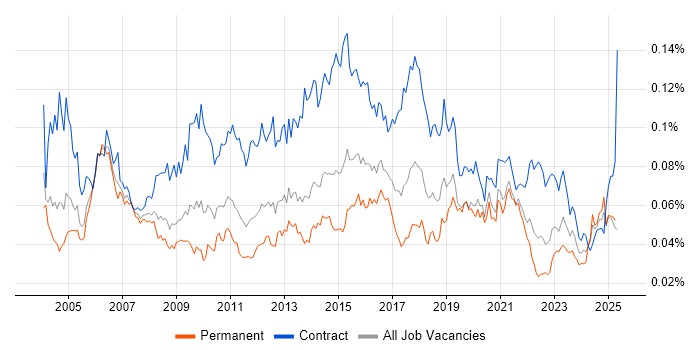Integration Analyst
UK
The median Integration Analyst salary in the UK is £52,500 per year, according to job vacancies posted during the 6 months leading to 16 May 2025.
The table below provides salary benchmarking and summary statistics, comparing them to the same period in the previous two years.
| 6 months to 16 May 2025 |
Same period 2024 | Same period 2023 | |
|---|---|---|---|
| Rank | 689 | 861 | 952 |
| Rank change year-on-year | +172 | +91 | +231 |
| Permanent jobs requiring an Integration Analyst | 22 | 34 | 27 |
| As % of all permanent jobs advertised in the UK | 0.040% | 0.034% | 0.027% |
| As % of the Job Titles category | 0.044% | 0.036% | 0.030% |
| Number of salaries quoted | 10 | 18 | 21 |
| 10th Percentile | £37,425 | £39,025 | £31,250 |
| 25th Percentile | £44,620 | £40,000 | £38,750 |
| Median annual salary (50th Percentile) | £52,500 | £43,250 | £62,500 |
| Median % change year-on-year | +21.39% | -30.80% | +13.64% |
| 75th Percentile | £53,750 | £59,313 | £75,000 |
| 90th Percentile | £54,625 | £72,000 | - |
| UK excluding London median annual salary | £52,500 | £40,000 | £34,375 |
| % change year-on-year | +31.25% | +16.36% | -22.32% |
All Permanent IT Job Vacancies
UK
For comparison with the information above, the following table provides summary statistics for all permanent IT job vacancies. Most job vacancies include a discernible job title that can be normalized. As such, the figures in the second row provide an indication of the number of permanent jobs in our overall sample.
| Permanent vacancies in the UK with a recognized job title | 50,303 | 93,916 | 91,216 |
| % of permanent jobs with a recognized job title | 90.61% | 94.69% | 91.48% |
| Number of salaries quoted | 27,096 | 67,168 | 57,442 |
| 10th Percentile | £29,750 | £28,500 | £32,500 |
| 25th Percentile | £41,250 | £38,500 | £45,000 |
| Median annual salary (50th Percentile) | £56,000 | £52,500 | £60,000 |
| Median % change year-on-year | +6.67% | -12.50% | - |
| 75th Percentile | £73,886 | £71,250 | £80,559 |
| 90th Percentile | £96,250 | £90,000 | £100,000 |
| UK excluding London median annual salary | £51,645 | £50,000 | £53,000 |
| % change year-on-year | +3.29% | -5.66% | +5.64% |
Integration Analyst
Job Vacancy Trend
Job postings that featured Integration Analyst in the job title as a proportion of all IT jobs advertised.

Integration Analyst
Salary Trend
3-month moving average salary quoted in jobs citing Integration Analyst.
Integration Analyst
Salary Histogram
Salary distribution for jobs citing Integration Analyst over the 6 months to 16 May 2025.
Integration Analyst
Top 9 Job Locations
The table below looks at the demand and provides a guide to the median salaries quoted in IT jobs citing Integration Analyst within the UK over the 6 months to 16 May 2025. The 'Rank Change' column provides an indication of the change in demand within each location based on the same 6 month period last year.
| Location | Rank Change on Same Period Last Year |
Matching Permanent IT Job Ads |
Median Salary Past 6 Months |
Median Salary % Change on Same Period Last Year |
Live Jobs |
|---|---|---|---|---|---|
| England | +143 | 22 | £52,500 | +21.39% | 5 |
| UK excluding London | +187 | 19 | £52,500 | +31.25% | 5 |
| North of England | +64 | 14 | £52,500 | +31.25% | |
| North West | +19 | 14 | £52,500 | +31.25% | |
| Work from Home | +124 | 12 | £52,500 | +6.60% | 7 |
| London | +95 | 3 | £49,250 | -12.83% | 1 |
| South East | +98 | 2 | £44,323 | -15.58% | 3 |
| East of England | +40 | 2 | - | - | 1 |
| South West | +104 | 1 | - | - |
Integration Analyst Skill Set
Top 30 Co-occurring Skills and Capabilities
For the 6 months to 16 May 2025, Integration Analyst job roles required the following skills and capabilities in order of popularity. The figures indicate the absolute number co-occurrences and as a proportion of all permanent job ads featuring Integration Analyst in the job title.
|
|
Integration Analyst Skill Set
Co-occurring Skills and Capabilities by Category
The follow tables expand on the table above by listing co-occurrences grouped by category. The same employment type, locality and period is covered with up to 20 co-occurrences shown in each of the following categories:
|
|
||||||||||||||||||||||||||||||||||||||||||||||||||||||||||||||||||||||||||||||||||||||||||
|
|
||||||||||||||||||||||||||||||||||||||||||||||||||||||||||||||||||||||||||||||||||||||||||
|
|
||||||||||||||||||||||||||||||||||||||||||||||||||||||||||||||||||||||||||||||||||||||||||
|
|
||||||||||||||||||||||||||||||||||||||||||||||||||||||||||||||||||||||||||||||||||||||||||
|
|
||||||||||||||||||||||||||||||||||||||||||||||||||||||||||||||||||||||||||||||||||||||||||
|
|
||||||||||||||||||||||||||||||||||||||||||||||||||||||||||||||||||||||||||||||||||||||||||
|
|||||||||||||||||||||||||||||||||||||||||||||||||||||||||||||||||||||||||||||||||||||||||||
